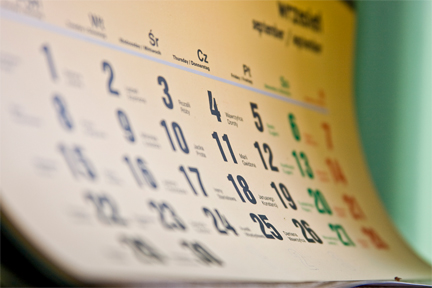OVULATION 101: 10 THINGS YOU SHOULD KNOW ABOUT YOUR PERIOD
You will have nearly 500 menstrual cycles during your lifetime. Yet, this natural process is still quite mysterious to many women and the myths run rampant. A normal menstrual cycle occurs every 21-35 days and lasts for 2-5 days. The hormonal and uterine changes are quite complex, and ultimately lead to the preparation of the uterus to accept a pregnancy. If conception does not take place, the uterine lining sheds, in the form of your period.
Let’s go over a few things about your ovaries and ovulation. A woman has two ovaries that lie between the uterus and the pelvic wall. Inside the ovaries are tiny cysts, called follicles, where your eggs live. On average, you are born with 2 million follicles with eggs in them. From birth until your death, these follicles will continue to disappear and die. By the time you reach puberty, you will have about 300,000 follicles with eggs inside them left. From this gigantic pool of eggs, a follicle (or sometimes follicles) will be selected each menstrual cycle to be “the chosen one” to ovulate. We do not know how this selection process happens, nor can we influence which egg is chosen.
Ovulation means the egg is released from the follicle in the ovary. Once you ovulate, the egg goes into the fallopian tube where it can be fertilized by a sperm. Usually, only one egg is released, and if fertilized, you have a singleton pregnancy. If 2 eggs are released and fertilized, you end up with fraternal twins. If fertilization does not occur, the uterine lining will break down and come out in the form of menstrual bleeding 14 days after ovulation.
Here are the most common questions we are asked about the menstrual cycle.
If the menstrual blood is dark red or black, does it mean there is something wrong? No, the color of the menstrual flow is not significant. The darker blood simply means it has been more broken down , or metabolized, before it comes out. On the other hand, bright red blood means the bleeding is more fresh.
If I am stressed about my period, will it come late? It is true that stress can delay ovulation. But the stress has to be in the first half of the cycle in order to push back the ovulation date. Once ovulation has occurred, the menstrual flow will start 14 days later, no matter how stressed you are.
Can I take a bath or swim during my period? Yes, there is no reason that you cannot be submerged in water during your menstrual cycle. In most cases, because there is increased pressure from the water, the blood will not actually come out of the vagina until you get out of the water.
Can I get pregnant if I have sex on my period? While it is unlikely, the answer is yes – possibly. If you have sex on the last day of the period, and the sperm lives for 5 days, and you ovulate early – on day 10 or 11 – you may conceive.
I noticed some white tissue that came out with my period. What is that? Occasionally, some of the uterine lining, called the endometrium, will be shed with the menstrual blood. It is not dangerous in any way.
Why do I have spotting in the middle of my cycle? Many women experience spotting at the time of ovulation. It occurs because there is a slight estrogen drop immediately before ovulation which prompts the uterus to shed a bit of the lining. It is not dangerous but rather shows that you are fertile.
What does it mean if I miss a menstrual cycle? There are a variety of reasons this can happen. Of course, one of the most common causes is pregnancy. In addition, missed cycles occur in women who are going through menopause and in women who are not ovulating. If you miss more than 3 cycles and are not pregnant, you should see your doctor to find out why.
Why do I have menstrual cramps? Menstrual cramps are actually contractions of the uterus. In labor, the uterus contracts to push the baby out. When not pregnant, it contracts to push the menstrual blood out. If a lot of blood needs to come out, the uterus will contract more vigorously to push that blood out. So often, painful menstrual cramps will go hand-in-hand with heavy periods.
Does an irregular pattern of bleeding mean I am not fertile or close to menopause? No, the way the blood comes out is not significant. Some women will start their period fast and furious, with heavy bleeding for 3 days, and then it’s over. Others will spot for a few days, then have a regular flow. Still others may bleed for a few days, stop completely for a day or two, and then restart. All of these patterns are normal. They do not tell us anything about your fertility. The way the blood comes out varies from woman to woman, and can change at different times of her life.
How much blood do I lose during my period? Blood loss is 10-80 mL with an average of 35 mL average, which is only about 2 tablespoons.




Leave a Reply
Want to join the discussion?Feel free to contribute!